This is an excerpt from a book I am compiling about girls growing up in the South. This is the first story that I received and it was so compelling that it set the whole book in motion. Katie was a friend and a lovely Christian woman. She struggled all her life, but kept the wonderful attitude toward life that shines through her story. She wrote this in "stream of consciousness" style and I have recorded it as she wrote it. She didn't receive much education as a girl, but continued to improve herself all her life. Her children called my daughter her "white grandchild" because of her love for Holly. Our lives wouldn't have been the same without her advice, grace, and love.
KATIE LOVETT HIGH
My name is Katie Lovett High.
I was born in
I started school very young. We didn’t have to have a birth certificate then, not even health shots. We went to school in a church. One room church out in the country. (Little
I started work for money at the age of 9 years old – dropping seed in a corn field. And chopping cotton. I sometime would make $1.00 a day and sometime $ 0.75 a day. Mr. Walton’s wife hired me to sweep yards for her. She would pay us in old clothes that her three daughters didn’t want no more. I remember one year after my sister Everlene got started to school we had been chosen to be in the Easter program. I had let her start help me sweep Mrs. Walton’s yards. So they gave us a large bundle of clothes that time. We were so glad. Everlene and I could dress up for the Easter program. Mrs. Hart gave us some shoes -- black and white saddle oxfords. They was too small, but we wore them to the church, anyway. I hated to walk back home that night because my feet hurted so bad, but I knew my dress was pretty and Everlene’s dress was pretty and we looked as pretty as the other childrens did. Mrs. Walton sold Mama one of her son’s suit for Arthur and he and I found his shoes in the Junk Pile. Of course we had to do a little work on his shoes, but we were still happy. We felt like we had climbed a big hill in our lives. We could go to church like other peoples.
When we finished our chores on weekends, we could go out to play. We didn’t have real toys, but we had animals to play with. My grandfather had 2 large work oxes. Their names were Dock and Dane. We grew up with the cows. We played with them (including) Arthur and my two youngest uncles, Curtis and James Godfry.
Seem like we stayed in that same way for such a long time. There was no work in the winter for none of us but Daddy. By the time he bought food for the whole family and pay Insurance bill, it wouldn’t hardly be any money left. My brother and I began to want to help better our living situation. We began to wish for some of the things like the neighbors had. So, I began to make our clothes anyway. When Mama would be sick, I had to take over all of the housework. I remember one time they all got sick with the flu except me. I had to cook, wash, cut wood, make the fire and go to the store. We didn’t have running water. We drew water from a well.
My brother left home at the age of 16. He went to
Then I began to think how life might be in the future for me. I was growing up in age. I was the only girl in the family for a while, so I guess I was a bit spoiled.
My grandparents had 9 childrens – 6 boys and 3 girls. My youngest 2 uncles grew up with my brother and me. My brother worked and made sure that we did, too. Everlene talked a lot and wanted things to go her way. Mary Lou wouldn’t talk to you if she didn’t know you. She sing a lot. My sister Betty Jean was short and pretty and talked and laughed a lot. All of my sisters and my brother looked like Mama, but I look like Daddy. I had started school when Mary Lou was born, but I didn’t have to miss many days out of school. She was born the 13th day of December.
The next year after Betty Jean was born, I worked in the peach orchard. My father was a fruit orchard man. He knew about fruit trees and how to make them bear good fruit. He knew how to bud a peach tree, to make it bear different fruits. He knew when to add the fertilizer to make the trees grow and what kind of insecticide to spray the trees with to keep away the insects. He knew how to prune the trees and cut away dead limbs.
When the fruit got ripe, we start to picking them. We had to choose the right ones to pick. We had to carry bags that holed (held) a bushel on our shoulder and stomach, fasten with straps. All day long, we was promised to be paid a dime for each bag, but we was told that so we would pick peaches faster and harder. We was given numbers and we would work so hard trying to earn more money. Somtime Mr. Gill would pay us more money and sometime we wouldn’t hardly make nothing. So this would be money for a new dress for homecoming at our church and for a good Sunday dinner. This went on every year for years.
After the peach picking was over, we then would go back to work on the farm. Picking cotton, picking peppers. When we pick the pepper, we would have to grade it before we could take it to the plant. When we picked the cotton we would have to pick at least twelve hundred and fifty pounds before we could take it to the gin. After being ginned and all the cotton seeds been taken out, the cotton would be made into bales. And they would weigh about 450 to 500 lbs.
Let me tell you what sharecropping means: Whoever owned the farm get half of all the money that is made on the farm. Half of everything else that raised on the farm if he want it, and you have to pay for your half of fertilizer and insecticide. You have to do all the work. If, for any reason, you have to borrow money for the farm or have to have outside workers, the sharecropper have to pay all of that. Sometime you would work all spring, summer, and fall and wouldn’t make enough money to buy your family clothes and shoes for winter. Sometime the boss man, rather the owner of the farm, would keep all of money came out of the farm.
I remember there was sometimes my mother would go to the barn and get the mule corn and cook it for us. She would cook hominy with the corn and sometime she would parch it and after we finish eating, we would be full. And could wait until next mealtime. After our grandfather gave us a heifer calf and later when she came in fresh and was giving milk, that was a blessing to us. At first we didn’t have a churn or dasher, so when her milk was ready to churn the first few times, Mama would shake it up and down in a bucket until the butter would come. After that my grandfather made her a dasher and she bought a churn. Then we could have cornbread muffins for breakfast, butter, and milk.
My grandfather, which is my mother’s father, was a craft maker also. He made work baskets. In those days, peoples used work baskets in the cotton field. They used clothes baskets. He made them and he could put a new bottom in chairs. And he made quilting frames. In those days, peoples made their own quilts. He would get to the woods and cut down white oak trees, bring them home, cut off the bark, split the trees up and then he would run the splits to make the baskets or whatever he wanted to make.
I remember my grandparents and us would be sitting under this large mulberry tree. Big Mama and Big Papa would be working so hard. I like to work and watch what and how they made things. After running them splits about tree length, they would roll them up and soak them in water. That help them to be more flexible to bend and slide more easily so they could weave in and around the basket frame or whatever they were making. Peoples came far and near and bought baskets and things from Big Papa. But never paid him much money, for anything they made.
He also was a blacksmith. In his workshop, he shod mules. In those days, peoples worked their farms with mules. This is when his work oxes was so much help to him. He really didn’t have to use the boss man’s mule to work his farm or for traveling. He used his oxes. He worked his farm with Dock and Dan. And he also had a 1- horse wagon so he would also hitch one to the wagon and we ride in the wagon wherever we had to go. So in his blacksmith shop he sharpen plowing tools such as scatter and scrapes, hoes, made bits to go in mules’ mouth and also he put shoes on Dock and Dan.
Then one day Big Papa and Mr. Gill had a bad disagreement, so Big Papa and his family moved away. My mother and we children was very sad. Daddy didn’t really care, because he and Big Papa didn’t get along so well. After that Big Mama began to be sick a whole lot. After some time passed Big Mama died and they we felt sorry for Big Papa, but he married again in such a short time. A woman that we didn’t like and I really don’t think she liked us. I never wanted to go to Big Papa’s house any more. Eventually Big Papa died, too. So we didn’t go around his wife any more.
Well, after this all happen, we grew up and continued in school and church. Our mother and father went to church with us sometime. We would go to church on Sunday morning and stay until late in the afternoon, go home, milk the cow, get in wood and water, eat dinner and go back to church again that night.
In the fall of the year on the farm is gathering time. We would pick cotton. After that was over we then would pull corn. That was another hard job – you could so easily pull your wrist out of place or cut your hands doing that. But it had to be done.
Sometime we would plow up the sweet potatoes and put them in hills. We would make the potato hills by putting down dead pine straw in a slightly dug out place. We first would leave the sweet potatoes out in the sun so they could dry out before putting them in the hill. It would take a lot of pine straw. Then we would get dry corn stalks and place them around them potatoes in a round circle, after piling the potatoes in a pile onto the pine straw. Then you have to stack the dry corn stalks very closely together around the potatoes. After you get the corn stalk as close as you could, then we would tie them together at the top so they look like a Indian tepee. Then they would just pile a lot of dirt, lots and lots of dirt, around the cornstalks. Some more pine straw and some more dirt, then they would leave a certain place so you could reach inside the potato hill and get sweet potatoes out of the hill whenever we needed to.
Then we would gather the peas. Sometimes we could store them in a sack or just put them out on the barn floor. When we wanted to cook some peas, we would put some in a sack, tie up the sack and get a piece of wood and beat the sack until all of the hulls would come loose. Then we would find out what direction the wind was blowing and we would pour the peas from one container to another until all of the dry hulls were blowing away. After picking the bad peas out, we washed them and cooked them.
There was a old woman that lived in the neighborhood. Her name was Aunt Sarah Brown. She lived with her sister, her niece and husband. Their names were
One cold and rainy Sunday, Aunt Sarah died. She died at home. They didn’t take Aunt Sarah’s body to the undertaker. They embalmed her body at home. Our parents went to their home to be with the bereaved family and left us childrens at home all night by ourselves. I had never been so afraid in my life. We were afraid to go from one room to another by our self. After Mama and Daddy came home the next day, we got all right. Our house had shutter windows – they are windows that look like doors. We were afraid to leave the windows open. I went to see Aunt Sarah’s corpse. Some one told me to rub my hands over her face so I wouldn’t be afraid of dead peoples no more, so I did. But I am still afraid of dead peoples.
My granddaddy operated a syrup mill, so in the late fall, people would strip their sorghum cane and sugar cane, cut it down and bring it to the syrup mill. Then Big Papa would start to grind the syrup cane by hitching a mule to a shaft and the mule would go round and round to grind the juice out of the cane into a very large pot. Then they would start the process of cooking the cane juice. And they would dip the foam off of the cane juice as it cooked so that the syrup would be a bright color. Sorghum syrup is darker than sugar cane and taste different, but the sugar cane syrup cost more. Sometime the owner of the cane would pay Big Papa off in syrup and he would sometime store it in barrels and we would enjoy eating the syrup by sopping it with bread or sometime we would cook with the syrup; if it was left in the barrel long enough the syrup would turn to sugar. And we would dissolve the syrup sugar by place it in warm water.
Our chores in the afternoon, such as sawing wood for the fire place and piling it on the front porch and getting something very light to start the fire in the morning. The house which we lived in was very old and shabby. We could look through the cracks in the floor. The rafts was rotten some place – seems as though you would fall through. The floors was made with big wide planks.
I remember my Big Papa made Mama a scrubbing mop for the floors to be cleaned with. The scrubbing mop was made out of a thick piece of wood about 1 ½ feet long and about 1 foot wide. He drill about 12 holes in the wood and attach a handle to the wood just like a hoe handle. We would stuff the holes in the mop with corn shucks. Very tight so they wouldn’t come out of the mop. Then we would mix some home made soap in hot water and scrub the floor with that and a little sand.
We made our own soap by using waste fat from the kitchen, a can of lye and water. We first would put the waste fat in a wash pot and then we would pour the lye on top of the waste fat, make a fire around the wash pot and cook the waste fat and lye very slowly until the fat and lye would look like a very thick foam. Then we would add water about a gallon at a time. The water had to be sterilized also. We would continue to add water as the soap cooked slowly until it became very thick. We would test it by sticking a long chicken feather in the soap and, if the feathers stayed on the stem, then we knew it about ready. We then could add a little pine tree rosin to help make it firm. Then we would put the soap back to cool so we could slice it into bars. We used this soap to wash the laundry and boil the clothes in the wash pot and they would come clean, like the floor would come so clean, until they looked white.
In the winter time we never were warm when the weather would be real cold or just cold and rainy. Sometime it would rain and the water would leak on our head. We would get up and move the bed around, or if we could, we would put down pots and pans to catch the water in. For a long time, our house had a wooden shingle top. By the house being old and shabby, when the March wind came a lot of the shingles would fall off of the top of the house, because they was rotten.
My three sisters was born in that house – Everlene, Mary Lou, and Betty Jean Lovett. Arthur and I were born before Mama and Daddy moved there. But we lived in that house for a long time. One day Mrs. Walton and her family sold their farm and house and moved to town.
We all had to use water from a dug well and something happen to the well and the water wasn’t good to use. At first our well water got so bad until we couldn’t use it. So Mama and Daddy would make us draw all the water out of the well in our spare time. I mean we would have to draw all of it out, but when the water came back in the well, it would still stink. It seem like something were growing in the well, so we had to stop using the water. Then we had to start carrying water from the neighbors’ house – those that would let us. But in the country, the houses is a long way apart, so that wasn’t much help. You never know how much water you use until you have to bring it from a long way. Then we discovered we had a water spring down in the cow pasture, which were another blessing from the Lord. So we carried all the water we needed from that spring. A spring is a vein of water that came up from the ground by itself. So we cleaned around the spring and had plenty of clean, clear good and pure water again. There also was something like a lake which the spring supplied water for the cows not far away and some time we would have to fight or kill snakes before we could get our water, but we got it just the same.
Mama wouldn’t hardly ever go to the spring because she was so afraid of snakes and worms. Mama was so easy going and nice and as long as she and her family could be together and barely survive, she would be happy. She taught us to love everybody and be thankful even though she knew what the situation was, but she didn’t complain. I loved her so much I almost felt sorry for her but I didn’t want to be like her. But I would have like to had her looks. She was very pretty. The rest of them looks like Mama and they have her beautiful color, but I looks like Daddy. But I really don’t care now because I know color is just skin deep.
Then, one day Mr. and Mrs. Walton sold their home and farm and moved to town. And the peoples that bought the place remodeled the house and when they had finish, they threw away a lot of good lumber so they let us get as much of the lumber as we wanted. So we didn’t have anyway to bring the lumber home, but to carry it in our arms. So we carried enough to fix the walls of the kitchen because before we fixed the kitchen, you could stand outdoors and reach in the kitchen and get things. Just like before they let us have electric sometimes if the wind blew hard enough it would blow the lamp light out. We used lamps for lighting because we didn’t have electric. We study our school lesson by lamp light. Arthur, Everlene and I. But after the man that owned the house saw that we were trying to fix the house, he started to do some work on the house. He put in glass windows, he put on a roofing shingles roof. And he wrapped the house in black and tan roofing siding. He also let Daddy rebuild the porch. We were so glad. For the first time our home looked more like a house instead of a barn. But we still didn’t have but four rooms. But the house looked so much better.
Everlene, Mary Lou, and I shared a bed until my brother left home. Sometime I use to wish I had a bed to sleep in by myself, but I thought it would never happen. I just sort of dream about it, but I never wanted to spend the night with other peoples. I always wanted to sleep at home, use my own hair comb, toothbrush, wear my own clothes and shoes. I never wanted to borrow other people’s things and didn’t want to lend……
Katie’s narrative ends here. She had written 20 pages of memories for me and intended to continue, but somehow never did or never got her later work to me.
Thank you, Katie. I know where you are and am so happy to have known you. You were a blessing to our lives. I love you.










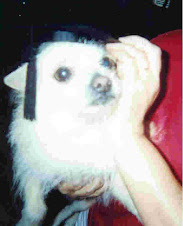

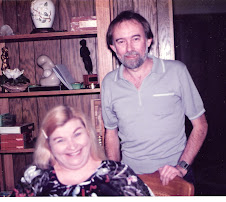
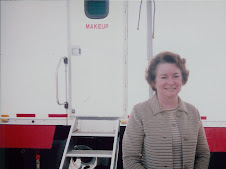

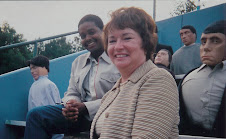






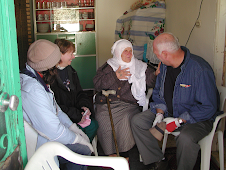
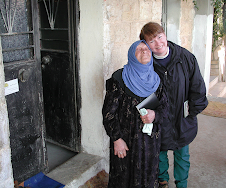


No comments:
Post a Comment